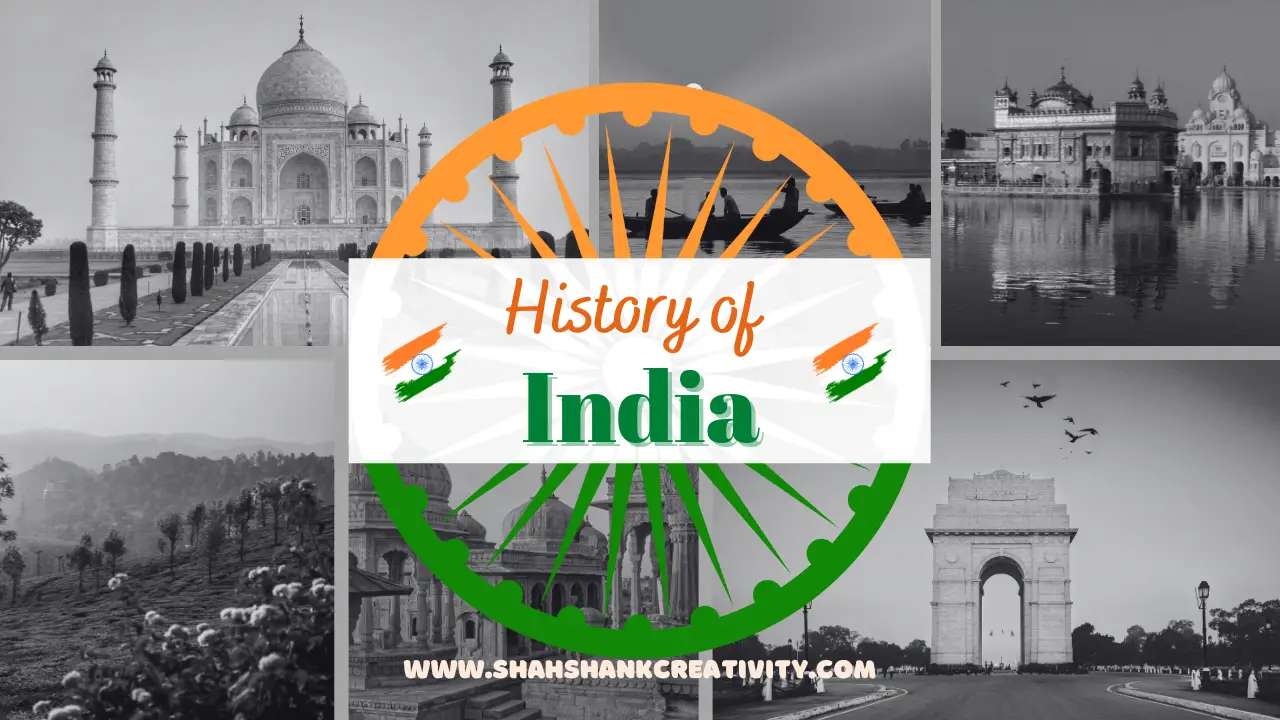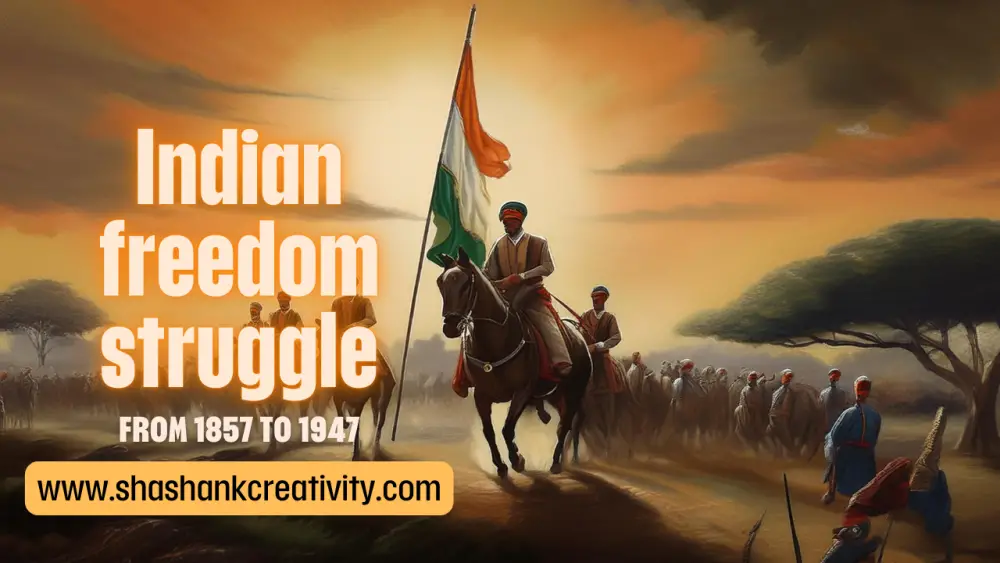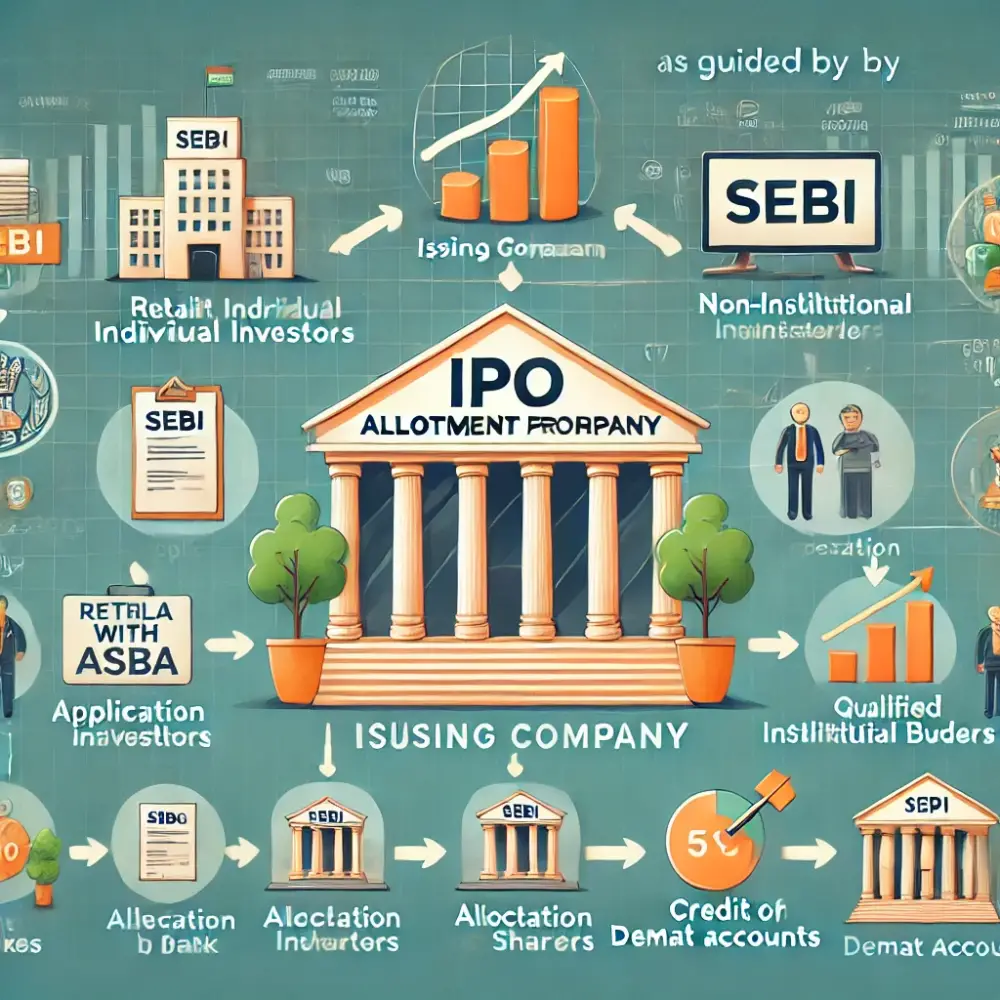Important Milestone of Indian history from 1857 to 2021

Important Milestone of Indian history from 1857 to 2021
- 1857 - The Indian Rebellion, also known as the Sepoy Mutiny, begins.
- 1858 - British Crown assumes direct control of India from the East India Company.
- 1875 - Foundation of the Indian National Congress (INC).
- 1885 - The first session of the INC takes place in Bombay.
- 1905 - Partition of Bengal leads to widespread protests.
- 1906 - Formation of the Muslim League.
- 1911 - King George V announces the reversal of the Bengal partition.
- 1915 - Mohandas Karamchand Gandhi returns to India from South Africa.
- 1917 - Champaran Satyagraha, Gandhi's first major civil disobedience movement in India.
- 1919 - Jallianwala Bagh Massacre in Amritsar.
- 1919 - The Montagu-Chelmsford Reforms are introduced.
- 1920 - Non-Cooperation Movement launched by Gandhi.
- 1922 - Chauri Chaura incident leads to the suspension of the Non-Cooperation Movement.
- 1927 - The Simon Commission arrives in India, triggering protests.
- 1928 - Motilal Nehru presents the Nehru Report, demanding self-government.
- 1929 - Jawaharlal Nehru's "A Tryst with Destiny" speech at the Lahore session of the INC.
- 1930 - Gandhi's Salt March begins.
- 1931 - Gandhi-Irwin Pact signed, leading to the release of political prisoners.
- 1935 - Government of India Act passed, granting limited self-governance.
- 1937 - Provincial elections held; INC wins in several provinces.
- 1939 - World War II begins; India becomes a party without consent.
- 1940 - Lahore Resolution passed by the Muslim League, calling for a separate Muslim state.
- 1942 - Quit India Movement launched by the INC.
- 1943 - Bengal Famine leads to a massive loss of life.
- 1944 - Gandhi's talks with Jinnah on the issue of Hindu-Muslim unity.
- 1945 - World War II ends; Labour Party comes to power in Britain.
- 1946 - The Cabinet Mission arrives in India to propose a new constitution.
- 1946 - Direct Action Day in Calcutta results in communal violence.
- 1947 - Lord Louis Mountbatten appointed as the last Viceroy of India.
- 1947 - The Indian Independence Act passed in the British Parliament.
- 1947 - June 3 - Plan for partition announced; Punjab and Bengal divided.
- 1947 - August 15 - India gains independence; Jawaharlal Nehru becomes the first Prime Minister.
- 1947 - August 15 - Pakistan is established as a separate nation.
- 1947 - August 17 - Mahatma Gandhi embarks on a fast for communal harmony.
- 1947 - October 26 - Maharaja Hari Singh signs the Instrument of Accession, bringing Jammu and Kashmir into India.
- 1948 - January 30 - Mahatma Gandhi assassinated by Nathuram Godse.
- 1948 - Integration of princely states into India begins.
- 1948 - Jammu and Kashmir conflict escalates with the First Indo-Pak War.
- 1949 - Constitution of India adopted.
- 1950 - India becomes a Republic; Dr. Rajendra Prasad becomes the first President.
- 1950 - India's first general elections held.
- 1950 - Adoption of the Indian flag and national emblem.
- 1951 - First Five-Year Plan launched for economic development.
- 1952 - Second general elections held; INC wins under Nehru's leadership.
- 1953 - Formation of the linguistic states of Andhra Pradesh, Kerala, and Karnataka.
- 1954 - The Dalai Lama seeks refuge in India after fleeing Tibet.
- 1955 - India-China Agreement on Tibet.
- 1956 - Reorganization of states on a linguistic basis.
- 1957 - India's first atomic reactor, Apsara, goes critical.
- 1959 - First general elections in Kerala; Communist Party wins.
- 1961 - Liberation of Goa from Portuguese colonial rule.
- 1962 - India-China War.
- 1964 - Death of Prime Minister Jawaharlal Nehru.
- 1965 - India-Pakistan War over Kashmir.
- 1966 - Indira Gandhi becomes the Prime Minister.
- 1967 - Naxalite movement starts in West Bengal.
- 1969 - Nationalization of banks.
- 1971 - India-Pakistan War leading to the creation of Bangladesh.
- 1974 - India conducts its first successful nuclear test, "Smiling Buddha."
- 1975 - Declaration of Emergency by Indira Gandhi.
- 1977 - Emergency lifted; Janata Party comes to power.
- 1980 - Indira Gandhi returns to power as Prime Minister.
- 1984 - Operation Blue Star, an Indian military operation in Amritsar's Golden Temple.
- 1984 - Assassination of Prime Minister Indira Gandhi.
- 1984 - Anti-Sikh riots in Delhi.
- 1985 - Rajiv Gandhi becomes Prime Minister.
- 1986 - Bhopal gas tragedy.
- 1989 - Insurgency in Kashmir intensifies.
- 1991 - Assassination of Prime Minister Rajiv Gandhi.
- 1991 - Economic liberalization initiated under Prime Minister Narasimha Rao.
- 1998 - India conducts a series of nuclear tests.
- 1999 - Kargil War with Pakistan.
- 2000 - The Atal Bihari Vajpayee government initiates the Golden Quadrilateral project.
- 2001 - Terrorist attack on the Indian Parliament.
- 2002 - Communal riots in Gujarat.
- 2004 - Indian National Congress returns to power.
- 2008 - Terrorist attacks in Mumbai (26/11).
- 2014 - Narendra Modi becomes Prime Minister.
- 2016 - Demonetization of high-denomination currency notes.
- 2017 - Implementation of the Goods and Services Tax (GST).
- 2019 - Abrogation of Article 370, revoking Jammu and Kashmir's special status.
- 2020 - COVID-19 pandemic disrupts the world and India.
- 2020 - India-China border tensions escalate in the Galwan Valley.
- 2021 - Farmers' protests against agricultural reforms gain prominence.
- 2021 - Second wave of the COVID-19 pandemic hits India.
You may interested in
Important Milestone of Indian history from 1857 to 2021
Discover the fascinating timeline of India's history from 1857 to 2021, highlighting significant milestones that shaped the nation. Delve into the influential events, political shifts, and remarkable developments that have defined India's journey over the years. Uncover the captivating history of India with this comprehensive timeline of important milestones.
The East India Company (EIC): Rise and Fall
The East India Company's history is a complex tale of trade, expansion, and eventual decline, ultimately leading to the establishment of direct British rule in India, which lasted until India gained independence in 1947.
Indian Freedom struggle from 1857 to 1947
The Indian freedom struggle was a series of events to end British rule in India, which lasted from 1857 to 1947. It began with the Revolt of 1857, also known as the Sepoy Mutiny, which spread across many regions. It continued with various movements, such as the Swadeshi movement, the Home Rule movement, the Khilafat and Non-cooperation movement, the Civil Disobedience movement, the Individual Satyagraha, and the Quit India movement. These movements were led by different leaders, such as Gandhi, Tilak, Besant, Nehru, Patel, Azad, and others.
Trending
Understanding the IPO Allotment Process and SEBI Guidelines in India
Initial Public Offerings (IPOs) are a significant step for companies seeking to raise capital from the public market. Investors, in turn, are keen on participating in IPOs to gain from potential listing gains and long-term growth. However, the allotment process can be complex, and the Securities and Exchange Board of India (SEBI) has laid down comprehensive guidelines to ensure fairness and transparency. This article explores the IPO allotment process and SEBI’s regulations governing it.
Is USA heading towards recessions? What data says ?
While the U.S. economy continues to grow, certain indicators, such as the rising unemployment rate and increased recession probabilities from reputable sources, suggest caution. The situation remains fluid, and close monitoring of economic indicators is essential to assess the potential for a recession in the near future.
Reason behind Indian market fall what investor should do
In a volatile market like today's, investors can adopt a strategic and balanced approach to protect their portfolios while seeking long-term growth opportunities. Here are some key actions to consider:
What is an IPO and How It Works?
An Initial Public Offering (IPO) is one of the most significant events in the financial world, marking a company's transition from being privately held to publicly traded. For businesses looking to raise capital, an IPO offers a unique opportunity to tap into a wide pool of investors. But for potential investors, an IPO can be an exciting opportunity to buy shares in a company at the early stages of its public market journey. In this blog, we'll break down what an IPO is, how it works, its significance, and the various aspects surrounding this process.
Why Financial Education is More Important Than Academic Education and Why It’s Missing in the Indian Education System
Despite the growing importance of managing money and understanding personal finance, most educational systems, including India's, have largely overlooked this essential skill. Financial education equips individuals with the knowledge to manage money effectively, make informed decisions, and plan for a secure future.
Understanding Authentication Methods: OTP, TOTP, Passwords, PINs, Patterns, and More in 2025
In today’s digital age, safeguarding personal and organizational data is paramount. To achieve this, various methods of authentication are used to ensure that only authorized individuals can access sensitive information or services. Among these methods are One-Time Passwords (OTP), Time-Based One-Time Passwords (TOTP), Passwords, PINs, and Patterns. Each of these authentication techniques has distinct characteristics, use cases, and security considerations.





